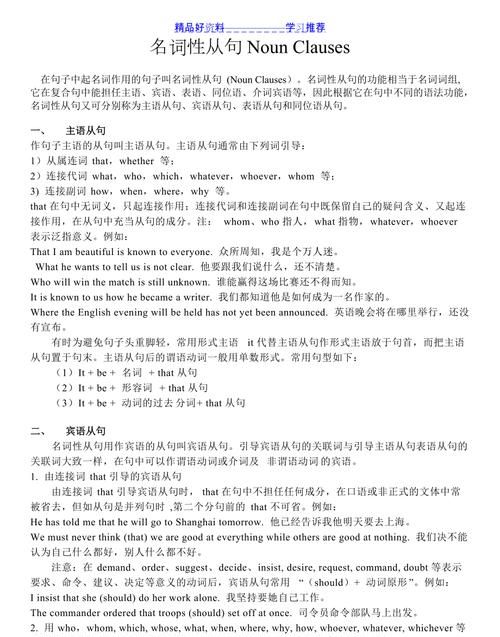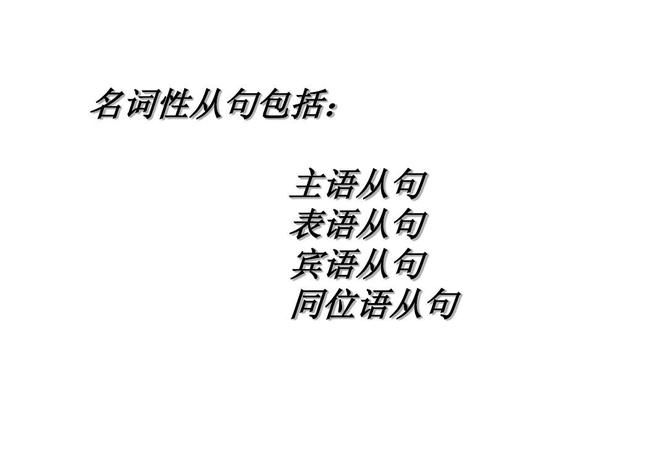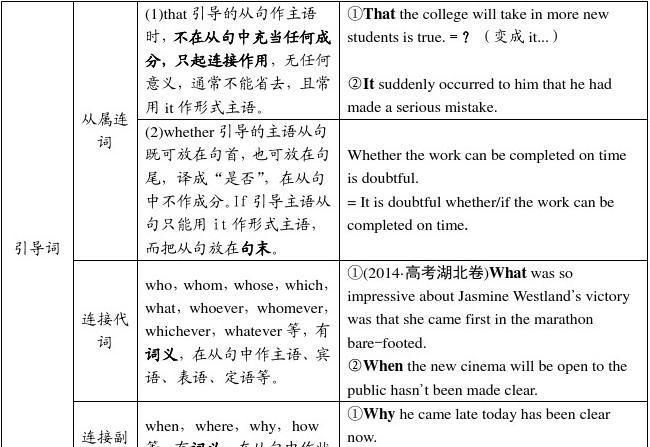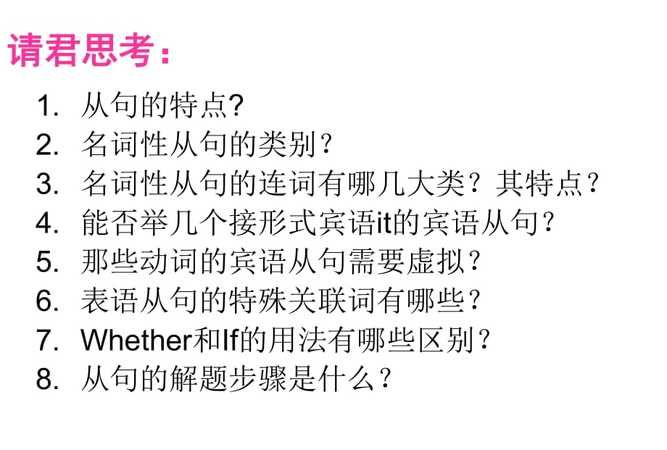本文目录
名词性主语从句例句
主语从句(Subject Clause)
定义:在复合句中充当主语的句子叫做主语从句.
第一部分:常规主语从句,即句子在复合句中充当一个主语
主语从句的时态:不受主句的时态影响和限制。
(1)That he finished writing the composition in such a short time surprised us all.
(2)Whether we will go for an outing tomorrow remains unknown.
(3)Who will be our monitor hasn't been decided yet.
(4) Whom we must study for is a question of great importance.
(5)What caused the accident remains unknown.
(6)Whatever you did is right.
(7)Whose watch was lost is unknown.
(8)What we need is time.
(9)What we need are good doctors.
小结:
(1)引导主语从句连词有that,whether,who,what,whatever等
(2)连词位于句首不能省略
(3)主语从句大多数情况下视为三单,但也有例外,如例9
第二部分:为了防止句子头重脚轻,通常把形式主语it放在主语位置,真正主语搁置于句末
(1)It is certain that he will win the match.
(2)It is true that he has made a very important discovery in chemistry.
(3)It is very likely that they will hold a meeting.
(4)It is strange that he should do that.
(5)It is important that we all should attend the meeting.
(6)It is strange that the man should have stuck to his silly ideas.
(7)It is a pity that we won't be able to go to the south to spend our summer vacation.
(8)It is still a mystery what caused the accident.
(9)It is said that he has gone to shanghai.(=He is said to have gone to shanghai)
(10)It is known to all that the gun powder was first invented by the Chinese.
(11)It is suggested that the work should be done with great care.
(12)It seems that he has seen the film.(=He seems to have seen the film)
(13)It happened that the two cheats were there. (=The two cheats happened to be there)
小结:
(1)以that 引出的主语从句,常以形式主语it引导. It is +形容词/名词/某些动词ed + that 从句.
(2) 在有些that从句中要用虚拟语气 (should+do/should+have done)例句4,5,6,11.
主语从句与宾语从句两者的用法和在句中的作用是不同的,下面从它们的各自用法,介绍:)~
一.主语从句
主语从句 定义:在句子中担当主语的是一个从句,这个从句就叫做主语从句。
主语从句是在复合句中充当主语的从句,通常放在主句谓语动词之前或由形式主语it代替,而本身放在句子末尾。
1. It 作形式主语和it引导强调句的比较
It 作形式主语代替主语从句,主要是为了平衡句子结构,主语从句的连接词没有变化。而it引导的强调句则是对句子某一部分进行强调,无论强调的是什么成分,都可用连词that。被强调部分指人是也可用who/whom。例如:
It is a pity that you didn’t go to see the film.
2. 用it 作形式主语的结构
(1) It is +名词+从句
It is a fact that … 事实是…
It is an honor that …非常荣幸
It is common knowledge that …是常识
(2) it is +形容词+从句
It is natural that… 很自然…
It is strange that… 奇怪的是…
(3) it +不及物动词+从句
It seems that… 似乎…
It happened that… 碰巧…
(4) it is+过去分词+从句
It is reported that… 据报道…
It has been proved that… 已证实…
3. 主语从句不可位于句首的五种情况
(1) if 引导的主语从句不可居于复合句句首。
(2) It is said , (reported) …结构中的主语从句不可提前。例如:
It is said that President Jingo will visit our school next week.
(3) It happens…, It occurs… 结构中的主语从句不可提前。例如:
It occurred to him that he failed in the examination.
(4) It doesn’t matter how/whether …结构中的主语从句不可提前。例如:
It doesn’t matter whether he is wrong or not.
(5) 含主语从句的复合句是疑问句时,主语从句不可提前。例如:
Is it likely that it will rain in the evening?
4. What 与that 在引导主语从句时的区别
What 引导主语从句时在从句中充当句子成分,如主语.宾语.表语,而that 则不然。例如:
What you said yesterday is right.
二:宾语从句的几个特征:1、引导词:what\which\whose\when\whether\if\where
2语序:宾语从句必须是用陈述语句。
如:I think that you must work harder.
宾语从句的引导词、连接词的区别、否定转移等现象。
(1)表达时间的几个句型:一般用when或者是what time:
What time will the train leave?
由于时刻都是固定的,也可以用一般现在时代替一般将来时:
What time does the train leave?
(2)时间的表达方式:8:19(nineteen past eight),7:57(three to eight),在时间的中间也可以加上分的单词(minutes)
(3)had better +动词原型。意思是提要求,建议。但是上下级不能用这种方式,因为语气太重:
You had better give up smoking .
(4)sb leave sth +地点
I left my book in my classroom yesterday.
(5)may I have your name(address\age)?一般询问对方的年龄、名字等,不要习惯以前的问法,这样很不礼貌,而是要采访上面的问法。以前的习惯是:how old are you? \what's your name?
(6)修饰名词的代词次序:限-描-大-形---年---颜----籍----物--------类+名词:
this is a bridge.
This is a beautiful bridge
补充:从句的语序永远是陈述句。

限制性定语从句例句
名词性定语从句例句 1
一.主语从句
1、Who was responsible for the accident is not yet clear.
2、Why he left so abruptly is not known to any of us.
3、When he’ll be back depends much on the weather.
4、Whether she comes or not doesn’t concern me.
5、Wherever he once lived is well preserved.
6、It is natural that they should have different views.
7、It was quite plain that she didn’t want come.
8、It’s a pity that he can’t swim.
9、It was a fearful disappointment to your mother that you didn’t come yesterday.
10、It happened that she wasn’t in that day.
11、It struck me that we ought to make a new plan.
12、It was rumored that he was suffering from a tone in the kidney.
13、It is estimated that 25 million school lunches are sold each day.
14、Where I spend my summer is none of your business .
15、It’s doubtful whether the payment is legal.
16、It was a question whether he should get married.
17、What the professor said is of great importance.
18、Whoever break the rules will be punished.
19、Who killed the scientist remains a question.
20、It doesn’t matter whether she will come or not.
二.宾语从句
1、 We never doubt that he is honest.
2、 I can’t imagine what made him act like that.
3、 Nobody can tell when she will arrive.
4、 Before I came downstairs I had prepared myself very carefully for what I must say.
5、 You must give it back to whoever it belongs to.
6、 I’ve heard that you’ve won a scholarship.
7、 I feel it a terrible thing that my mother should have to toil so endlessly.
8、 We are talking about whether we admit students into our club.
9、 He told me that he was preparing for the English test.
10、Our teacher told us that light travels much faster than sound.
11、Can you tell me how I can get to the zoo?
12、The doctor insists that I give up smoking.
13、She remember nothing about him except that his hair is black.
14、I suggest that they shouldn’t drive along the coast.
15、Have you found out how wide the ditch was?
16、Tomorrow at this time we will know who is elected?
17、Everybody knows that money doesn’t grow on tree.
18、The villager didn’t realize how serious the pollution was until the fish in the river died.
19、She said that she would come to the meeting.
20、The book will tell you what the best CEO should do.
三.表语从句
1、The fact is that he didn’t notice the car until too late.
2、The mystery is whether he ever went there at all.
3、The question is why he likes the place so much.
4、The problem is not who will go but who will stay.
5、Your brother’s health is not what it used to be.
6、The question is whether they will b able to help us.
7、His suggestions is that we should stay calm.
8、It sounds as if someone is knocking at the door.
9、He looked just as he had looked ten years ago.
10、That is because he didn’t understand me.
11、That is why he got angry with me.
12、The problem is who we can get to replace her.
13、The trouble is that I lost her address.
14、The questions is whether we can rely on him.
15、That is because we are in need of money at that time.
16、He looked as if he was going to cry.
17、The reason why he has to go is the his mother is ill in bed.
18、The questions is whether it is worth doing.
19、The mountain is no longer what is used to be.
20、The questions is what caused the accident.
四.同位语从句
1、They had to face the fact that the nea
rest filling station is 30 miles away.
2、Have you any idea how soon they are coming?
3、Obviously there was little probability that they would succeed, but they didn’t mind.
4、The suggestion that the new rule be adopted came from the chairman.
5、There is a feeling in me that it is going to rain.
6、The proposal has been put forward that the flight should be cancelled.
7、The government gave an order that all the house should be pulled down in three weeks.
8、We haven’t settled down the question where we are going to spend our summer vocation.
9、There is no doubt that he will keep his promise.
10、Many British parents hold the view that teenagers shouldn’t spend too much time online.
11、The thought that they could cross the whole continent was exciting.
12、I’ve come to the conclusion that it was unwise to do that.
13、They expressed the wish that she accept the award.
14、The question whether it is right or wrong depends on the result.
15、The rumor spread that a new school would be built here.
16、The questions who should do the work require consideration.
17、The suggestion that the new rule be adopted came from the chairman.
18、The news that oil price will go down is untrue.
19、The question why so many animals died suddenly in that area remains unsettled.
20、We have no scientific proof for the idea that time travel is impossible.
名词性定语从句例句 2
that常用作关系代词,可指代某人,也可指代某物,指物时有的时候可用which替换that,指人时可用who替换。但在下列情况下,一般用that。
一、that指代某物事时
1.先行词为all, few, little, much, the one, something, anything, everything, nothing等时。如:
(1)We'll do all that we can to protect the endangered plants and animals.
我们将尽我们的最大努力来保护那些濒危的动植物。
(2) There is much that I wan to tell you.
我有很多想要告诉你的话。
(3) Is there anything that I can do for you?
有什么我可以帮你的吗?
2. 先行词被all, every, no, some, any, (a)few, (a)little, much等限定词修饰时。如:
(4) You can borrow any book that you want to read in our school library.
在我们图书馆,你可以借任何你想读的书。
3. 先行词被序数词或形容词最高级修饰时。如:
(5)This is the most beautiful city that I've ever seen.
这是我见过的最漂亮的城市。
4. 先行词被the only, the very, the right, the last 等修饰时。如:
(6)This is the very factory that they visited last summer holiday.
这恰好是他们去年参观的那个工厂。
(7)This is the only painting in this style that we have.
这种风格的画我们仅有一幅。
5. 先行词是并列结构,既有人又有物时。如:
(8)He talked happily of the writer and his books that interested him.
6. 先行词前有the same 修饰,表示和先行词是同一物时。如:
(9)This is the same purse that I lost yesterday.
这就是我昨天丢的那个钱夹。
注:如果表示的是与先行词同一类或相似的某物,则用the same…as….如:
(10)This is the same purse as I lost yesterday.
这个钱夹和我昨天丢的那个一样。
7. 先行词为数词时。
(11)Look at the books on the bookshelf. You can see the two that you bought me for my birthday.
瞧书架上那些书。你可以看到我过生日时你买的那两本。
8. 如果which引导的定语从句中又含有一个定语从句,为避免重复,第二个定语从句用that。如:
(12)They built a factory which produced things that had never been seen.
他们建了一工厂,生产以前从未见过的东西。
9. 以which作主语开头的特殊问句,为了避免重复,定语从句用that。如。
(13)Which is the bus that you will take?
你要乘的是哪一班车?
10. 关系代词在定语从句中作表语时,而且通常省略。如:
(14)My hometown is no longer the place that it used to be.
我的`家乡再也不是以前那个样子了。
11. 关系代词在there be 句型中作主语时,而且常可以省略。如:
(15)This is the fastest train (that) there has ever been.
这是有史以来最快的列车。
二、that 指代某人时。
1. 泛指某人时。如:
(16)He is a man that is never at a loss.
他是一个从未一筹莫展的人。
2. 主句是以作主语的who开头的特殊问句,为了避免重复时。如:
(17)Who is the person that is talking with our headmaster?
和我们校长说话的那人是谁?
3. 先行词前有the same时。如:
(18)This is the same man that gave us a talk last year.
这和去年给我们作报告的是同一人。
4. 关系代词在定语从句中作表语时。如:
(19)He has changed. He was not the man (that) he was 10 years ago.
他变了。他再也不是10年前的他了。
另外,that也可用作关系副词,表示时间、地点、原因和方式,在口语中可以用来代替when, where, why 引导的定语从句。在以下名词day, year, time, moment, reason, place等作先行词时,可用that作关系副词引导定语从句。如:
(20)I'll never forget the day (that) I joined the League.
我永远不会忘记我入团的那一天。
(21)Is this the reason (that) they were late for the meeting?
这就是他们开会迟到的原因吗?
(22)We want to find a place (that) we can have a picnic.
我们想找一个我们能野餐的地方。
(23)This is the first time that I have been abroad for traveling.
这是我第一次到国外去旅游。
(注:先行词是time,前面有序数词或last修饰时,常用that引导定语从句或者省略。)
当先行词为表示方式的词the way时,可用that引导定语从句, that常可以省略。
(24)I don't the way you speak to her.
我不喜欢你和她说话那种方式。

名词性从句的例句及翻译
在句子中起名词作用的句子叫名词性从句 (Noun Clauses).名词性从句的功能相当于名词词组,它在复合句中能担任主语、宾语、表语、同位语、介词宾语等,因此根据它在句中不同的语法功能,名词性从句又可分别称为主语从句、宾语从句、表语从句和同位语从句.
拿主语从句举例吧:
What he wants to tell us is not clear.他要跟我们说什么,还不清楚.
Who will win the match is still unknown.谁能赢得这场比赛还不得而知.
It is known to us how he became a writer.我们都知道他是如何成为一名作家的.
Where the English evening will be held has not yet been announced.英语晚会将在哪里举行,还没有宣布.

主语从句例句
一、主语从句定义:在句子中担当主语的是一个从句,这个从句就叫做主语从句。
二、主语从句例句:
1. What surprised me most was that the little girl could play the violin so well.
2. Who will go to the concert is not known.
3. That she was chosen made us very happy.
4. Whether she will come or not is still a question.
5. Which book they will choose is still unknown.
6. When we shall hold our sports meet is not decided.
7. It’s strange that he knows nothing about it.
8. It is a pity that she has made such a mistake.
9. It is said that President Jingo will visit our school next week.
三、主语从句的引导词
主语从句通常由连词that和whether、连接代词或连接副词以及关系代词型what引导。
1. that引导
That he is still alive is a wonder. 他还活着,真是奇迹。
That we shall be late is certain. 我们要晚了,这是确定无疑的。
That he should have ignored the working class was natural. 他忽视工人阶级是很自然的。
That she is still alive is a consolation. 她还活着是使人感到宽慰的。
That she became an artist may have been due to her father’s influence. 她成为画家可能是受她父亲的影响。
That you are coming to London is the best news I have heard this long time. 你将来伦敦是好久以来我听到的最好消息。
That she was chosen made a tremendous stir in her village. 她被挑选上,在她村 子里引起很大轰动。
2. whether引导
Whether it will do us harm remains to be seen. 是否对我们有害还要看一看。
Whether they would support us was a problem. 他们是否会支持我们还是一个问题。
3. 连接代词引导
Whoever is top from wins the game when two matched players meet. 两强相争勇者胜。
Whichever (of you) comes in first will receive a prize. 无论(你们)谁先到都可以得奖。
Whichever you want is yours. 你要哪个哪个就是你的。
4. 连接副词引导
When we arrive doesn’t matter. 什么时候到没有关系。
How it was done was a mystery. 这是怎样做的是一个谜。
How this happended is not clear to anyone. 这件事怎样发生的,谁也不清楚。
How many people we are to invite is still a question. 邀请多少人还是一个问题。
Where I spend my summer is no business of yours. 我在哪里过暑假不关你的事。
5. 关系代词型what引导
What we need is money. 我们需要的是钱。
What I want to know is this. 我想知道的就是这一点。
What’s done is done. 事已成定局。
What he says is not important. 他说的话并不重要。
What I am telling you is mere impressions. 我和你说的都不过是一些印象而已。
What make the river more beautiful are the lotus plants growing in the water. 为河水增色的是水里的荷花。
What you need is a good-sized canvas bag. 你需要的是一个比较大的帆布袋。
What I am afraid of is their taking him to Portugal. 我担心的是他们把他带到葡萄牙去。
What struck me was that they have all suffered a lot. 给我很深印象的是他们都受过很多苦。
四、主语从句与形式主语it
有时为了考虑句子平衡,通常在主语从句处使用形式主语it,而将真正的主语从句移至句末。这分三种情况:
(1) 对于以连词that引导的主语从句,通常用形式主语代主语从句:
It’s a pity that he didn’t come. 很遗憾他没来。
It is important that he should know about this. 他必须知道此事。
It’s vital that we be present. 我们出席是至关重要的。
It was intended that you be the candidate. 大家的意图是让你当候选人。
It is important that this mission not fail. 这项使命不失败至关重要。
It is essential that a meeting be convened this week. 本周开一次会非常重要。
It is appropriate that this tax be abolished. 废除这个税是恰当的。
It’s unfair that so many people should lose their jobs. 竟有这么多人失业这是不公平的。
It’s amazing that she should have said nothing about it. 她竟未谈及此事令人惊讶。
It’s unthinkable that they should deny my request. 他们竟然拒绝我的请求,这是不可思议的。
That they should refuse to sign the petition required great courage. 他们拒绝在请愿书上签字这是需要很大勇气的。
(2) 对于以连接代词(副词)引导的主语从句,可以使用形式主语代主语从句,也可直接在句首使用主语从句:
Whether they would support us was a problem. 他们是否会支持我们还是一个问题。
It was a problem whether they would support us. 他们是否会支持我们还是一个问题。
It remains to be seen whether it will do us harm or good. 它对我们是利是害,还得看看再说。
(3) 对关系代词型what引导的主语从句,通常直接将主语从句放在句首。如:
What we need is money. 我们需要的是钱。
What I want to know is this. 我想知道的就是这一点。
有时也可将助用形式主语。如:
It is clear enough what he meant. 他是什么意思很清楚。
(4) 如果句子是疑问句,则必须用带形式主语it的结构:
Is it true that he is the girl’s father? 他是那女孩的父亲,是真的吗?
How is it that you are late again? 你怎么又迟到了?
五、连词that的省略问题
引导主语从句的连词that 有时可省,有时不能省,其原则是:若that引导的主语从句直接位于句首,则that不能省略;若that引导的主语从句位于句末,而在句首使用了形式主语it,则that可以省略:
That you didn’t go to the talk was a pity. 很遗憾你没去听报告。(that不可省)
It was a pity (that) you didn’t go to the talk. 很遗憾你没去听报告。(that可省)

以上就是关于名词性主语从句例句00句 ,名词性主语从句例句的全部内容,以及名词性主语从句例句100句 的相关内容,希望能够帮到您。

